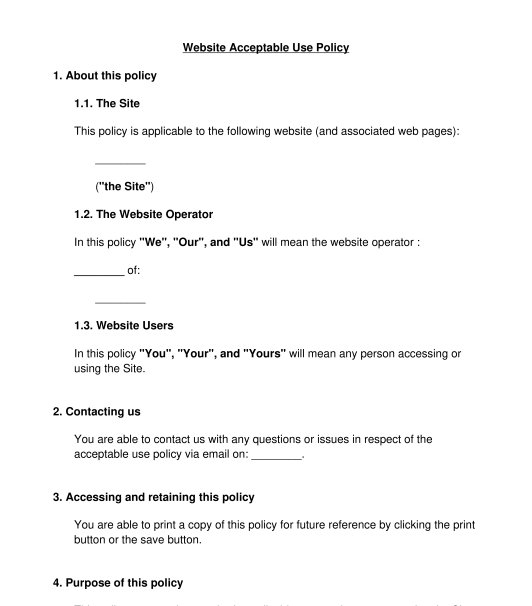 15/11/2025
15/11/2025

Answer a few questions and your document is created automatically.

Your document is ready! You will receive it in Word and PDF formats. You will be able to modify it.

 15/11/2025
15/11/2025
 Word and PDF
Word and PDF
 4 to 6 pages
4 to 6 pages
A website acceptable use policy (also known as an AUP) explains how website users can gain access to and use a website. This policy can be used by website operators that are based in the United Kingdom.
The purpose of an acceptable use policy is to set out the standards and rules that website users must comply with whenever they use or access the website. This type of policy document is not legally binding.
The terms and conditions of use will create a binding contract with the website user. The terms and conditions will often refer to and incorporate an acceptable use policy.
No, it is not mandatory to hold this kind of policy. It is however sensible and best practice to have a policy of this nature. Online safety laws are currently being updated so that website owners will soon have a duty of care to:
The policy can be finalised and placed on the website, in an easily accessible location. The website operator should ensure that any terms and conditions of use refer to and provide a link to the policy.
A website will need to hold other policies and documents, which refer to or may be read alongside the policy. This might include:
This policy can be used for a variety of different websites. However, a website operator should consider whether it may need a specialist policy if it carries out activities that are regulated or restricted in some way. A regulatory body may impose certain requirements on a website, including certain acceptable use provisions which should be used.
Websites that are aimed towards children should consider specialist advice.
The policy can remain in place indefinitely. The website operator should ensure the policy is updated from time to time to make sure that the information is accurate and in line with all relevant legal provisions.
The policy should:
The main legal frameworks applicable to the policy are:
The governing/supervisory body for upholding information rights is the Information Commissioner's Office (the ICO).
The Office of Communications (Ofcom) is the regulator for Online Safety.
You fill out a form. The document is created before your eyes as you respond to the questions.
At the end, you receive it in Word and PDF formats. You can modify it and reuse it.
Website Acceptable Use Policy - Template - Word and PDF
Country: United Kingdom